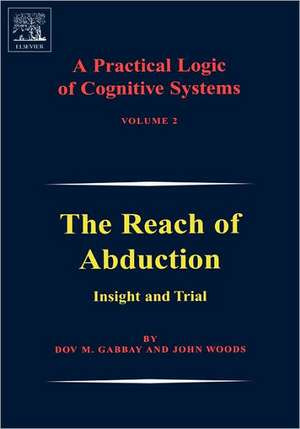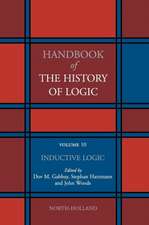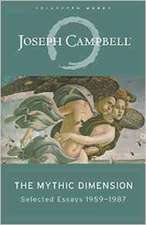A Practical Logic of Cognitive Systems: The Reach of Abduction: Insight and Trial
Autor Dov M. Gabbay, John Woodsen Limba Engleză Hardback – mai 2005
Underlying their analysis of abductive reasoning is the authors' conception ofpractical agency. In this approach, practical agency is dominantly a matter of thecomparative modesty of an agent's cognitive agendas, together with comparatively scant resources available for their advancement. Seen in these ways, abduction has a significantly practical character, precisely because it is a form of inference that satisfices rather than maximizes its response to the agent's cognitive target.
The Reach of Abduction will be necessary reading for researchers, graduatestudents and senior undergraduates in logic, computer science, AI, belief dynamics, argumentation theory, cognitive psychology and neuroscience, linguistics, forensic science, legal reasoning and related areas.
Key features:
- Reach of Abduction is fully integrated with a background logic of cognitive systems.- The most extensive coverage compared to competitive works.- Demonstrates not only that abduction is a form of ignorance preservinginference but that it is a mode of inference that is wholly rational.- Demonstrates the satisficing rather than maximizing character ofabduction.- The development of formal models of abduction is considerably more extensive than one finds in existing literature. It is an especially impressive amalgam of sophisticatedconceptual analysis and extensive logical modelling.
· Reach of Abduction is fully integrated with a background logic of cognitive systems.· The most extensive coverage compared to competitive works· Demonstrates not only that abduction is a form of ignorance preservinginference but that it is a mode of inference that is wholly rational.· Demonstrates the satisficing rather than maximizing character ofabduction.· The development of formal models of abduction is considerably more extensive than one finds in existing literature. It is an especially impressive amalgam of sophisticatedconceptual analysis and extensive logical modelling.
Preț: 1162.70 lei
Preț vechi: 1592.73 lei
-27% Nou
Puncte Express: 1744
Preț estimativ în valută:
222.51€ • 241.61$ • 186.91£
222.51€ • 241.61$ • 186.91£
Carte tipărită la comandă
Livrare economică 22 aprilie-06 mai
Preluare comenzi: 021 569.72.76
Specificații
ISBN-13: 9780444517913
ISBN-10: 044451791X
Pagini: 496
Dimensiuni: 150 x 225 x 38 mm
Greutate: 0.89 kg
Editura: ELSEVIER SCIENCE
ISBN-10: 044451791X
Pagini: 496
Dimensiuni: 150 x 225 x 38 mm
Greutate: 0.89 kg
Editura: ELSEVIER SCIENCE
Public țintă
For researchers, graduate students and senior undergraduates in logic, computer science, AI, belief dynamics, argumentation theory, cognitive psychology and neuroscience, linguistics, forensic science, legal reasoning and related areas.Cuprins
Acknowledgements.Preface. A Practical Logic of Cognitive Systems 1. Introduction 2. Practical Logic Conceptual Models of Abduction 3. The Structure of Abduction 4. Explanationist Abduction 5. Non-Plausibilistic Abduction 6. Diagnostic Abduction in AI 7. The Characteristic and the Plausible 8. Relevance and Analogy 9. Interpretation Abduction Formal Models of Abduction 10. A Glimpse of Formality 11. A General Theory of Logical Systems 12. A Base Logic 13. An Abductive Mechanism for the Base LogicBibliography.Index .
Recenzii
"This book starts with a philosophical analysis of abduction, overviews the previously proposed approaches, and explains the state-of-the-art and algorithms for formalizing abduction." --Olga M. Kosheleva, in MATHEMATICAL REVIEWS













